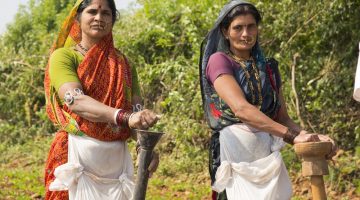A new chapter in India’s agri-export journey is beginning – one that of leveraging science and technology to enhance the purity and global reputation of Punjab’s iconic Basmati rice.
On April 16th, 2025, the Department of Agriculture and Farmers Welfare, Government of Punjab, organised a major workshop titled “From Field to Fork: Ensuring Basmati Purity through Comprehensive Traceability in Punjab” at Punjab Kheti Bhawan. In this workshop, scientists, entrepreneurs, exporters, industry and policy makers shared a common vision with various stakeholders – the Government’s goal is to create a Basmati.NET, a digital traceability system that is inspired from the success of GrapeNet model.

Why establish scientific traceability now?
The urgency for traceability systems like Basmati.NET stems from global market demands for residue-free, compliant and global markets for agri-exports. With the increased narrative against pesticides, traceability is no longer optional; it is mandatory to continue our leadership in Basmati Rice.
In 2003, India faced a major setback when New York rejected 17 consignments of grapes due to high pesticide residues. The crisis led to the creation of GrapeNet, a digital certification system for export-worthy grapes that has restored global confidence in Indian produce. Today, this system has also been envisaged for Basmati rice—a high-value crop grown in Punjab and exported worldwide.

Key Highlights from the Workshop
🔹 A Shared Vision for Basmati Net
Dr. Kaushik Banerjee, Director, ICAR-NRC for Grapes, stressed that GrapeNet’s success lies in the complete structure of the state agriculture department, laboratories, certification bodies and farmers. He said, “Basmati Exporters from Punjab will get access to 48 NABL accredited labs across India; the moment the scientific version of Basmati.NET is implemented.”

🔹 Insights from the ground: Pilot projects promising
Shri Jaswant Singh, Punjab’s Agriculture Department Director, shared the positive results of the pilot project in Chugawan village, where traceability practices were implemented. As the results of the project were promising, the intent is to extend the roll-out to a larger area.

🔹 Research-driven innovation
Dr. Satbir Singh Gosal, Vice Chanceller, Punjab Agricultural University, highlighted the climate benefits of Punjab in the cultivation of fragrant Basmati rice and mentioned the research done by the University in developing pest-resistant, low-residue Basmati varieties.

Dr. (Mrs.) Ajit Dua, CEO, PBTI shared her insights on the progress of Punjab Bharat Laboratory in testing for Basmati Exports and proposed PBTI as the National Referral Laboratory for Basmati.NET

Mr. Vikram, Manager, Agribusiness & Sustainability, LT Foods elaborated its model to ensure direct farmer participation and stringent export testing for MRL compliance.

The workshop witnessed an encouraging partnership with key players from crop protection, export and agri-tech sectors, including Mahila Bio, BASF, Syngenta, UPL, Nalgonda, LT Foods, and associations like CropLife India, ACFI and CCFI.
Addressing Regulatory Realities
A key topic of discussion during the workshop was the complexity of international pesticide residue standards. Due to different Maximum Residue Levels (MRLs) in markets like the European Union, United States, United Arab Emirates, it is difficult for farmers to adhere to common standards. Pre-shipment residue testing and coordinated sampling protocols are required.
The Road Ahead
In order to implement Basmati.NET the following next steps are proposed –
✅ Creation of a Joint Task Force
Comprising representatives from the Department of Agriculture, PAU, PBTI, APEDA and crop protection industry to guide the development of Basmati.NET and ensure seamless coordination among stakeholders.
✅ A field trip to NRCG Pune
To gain first-hand experience of the GrapeNet ecosystem, a field trip is recommended for the members of the Joint Task Force.
✅ Expansion of Pilot Projects
Based on the success of Chugawan, a scientific version of Basmati Net will be implemented in at least two more blocks, with LT Foods being the Exporter Partner and CropLife India leading the awareness and capacity building activities.
The Bigger Picture: Strengthening India’s Global Agricultural Footprint
While only a small percentage of Basmati is currently exported to the EU, the workshop reminded stakeholders to consider the entire global and domestic market. By ensuring rigorous traceability and compliance, India can secure its leadership in premium agri-exports—especially at a time when global consumers are increasingly conscious of food origin and safety.
As Mr. P.P.S. Pangli Borlaug Farmers Association eloquently described, “Agriculture can’t wait.” With unified efforts across Government, academia, and industry, Basmati.NET could set a gold standard for Indian agricultural exports—offering not just traceability, but trust from seed to shelf.

Read the full Report here- https://shorturl.at/nKH9g
Conclusion
This workshop wasn’t just a meeting—it was a movement. A movement toward residue-free, globally competitive Basmati rice backed by digital infrastructure, scientific rigor, and multi-stakeholder synergy. CropLife India proudly supports this transformation and remains committed to building a future where Indian farmers thrive and Indian produce earns the world’s trust.







